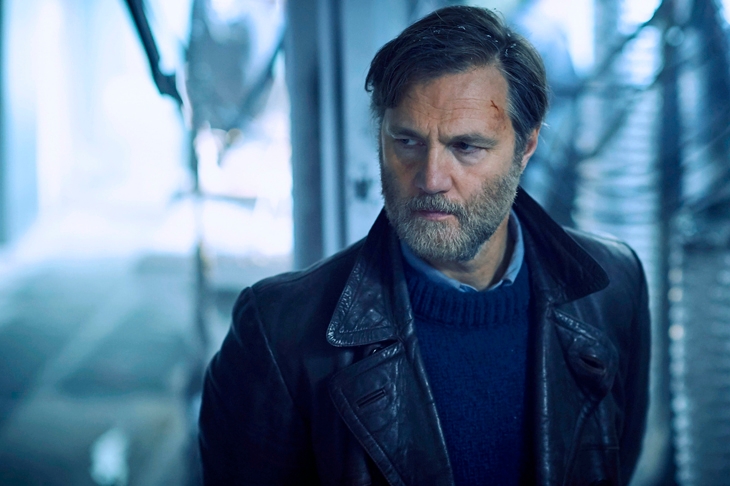BBC2 has a new drama series for Friday nights. The main character is a world-weary middle-aged police inspector with an unshakeable commitment to smoking. His work partner is a feisty female officer in her twenties who combines salt-of-the-earth irreverence with being a damn good cop. Between them, they’re investigating the murder of an attractive young woman who their colleagues immediately assumed was a prostitute, and whose death reminds the inspector of a previous investigation that continues to haunt him — which is why his boss is constantly trying to take him off the case.
But if this makes you think that The City & The City is yet another identikit crime drama, then you couldn’t be more wrong. The basic storyline may be thoroughly conventional; but only, it seems, as a deliberate counterpoint to the intriguing and highly imaginative strangeness of the setting.
Inspector Borlu (David Morrissey) does his policing in the city of Beszel, a place that goes beyond the merely fictional and into the realms of mythical. Its trappings have the feel of Eastern Europe — especially those parts that have resisted a smoking ban — but its citizens speak in English, which they learned from British traders 500 years ago. They write in English too, although with a sprinkling of random accents — as in a poster warning that the secret police ‘löök jušt liké yöu and me’.
More mysteriously still, Beszel directly borders another fictional/mythical city called Ul Qoma, and relations between the two are not so much strained as completely forbidden. Any tourists who (inexplicably) visit Beszel must attend a two-week training course instructing them in such local etiquette as never even looking at Ul Qoma, and ideally developing an inability to see it. Unfortunately for Borlu, it now appears that the dead woman was an American student living in Ul Qoma, and his investigation will be a bit tricky without visiting the place.
Not, in fact, that the investigation has taken up very much of the programme’s time so far. Instead, it’s been more concerned with slowly establishing its decidedly unsettling atmosphere and pondering the wider issues and implications of human tribalism.
All of which might make The City & The City sound somewhat po-faced. But, while that wouldn’t be unfair, it wouldn’t be the whole story either. Faced with such solemn material, some dramas might have been unable to resist throwing in the odd moment of knowing playfulness. Yet, by playing everything so utterly straight, this one unexpectedly turns the po-facedness to its advantage — with its own portentousness worn so unashamedly as to become almost a badge of honour. And at a time when so many TV dramas seem to be timidly second-guessing what their audiences (or commissioners) want, that feels distinctly refreshing.
Less impressive was Dave Allen at Peace (BBC2, Monday), which came across more as notes towards a biographical drama than the thing itself. The show mixed scenes from Allen’s life with recreations of his TV sketches and monologues, but neither of these elements quite worked. The life-scenes gave the impression of key events being perfunctorily ticked off from a list (cruel nuns; losing half a finger; changing his name to Dave Allen: check, check and check). The TV bits suffered from the obvious problem that Aiden Gillen as Allen lacked the same comic timing. In any case, the programme often felt like a recreation itself — specifically of those increasingly formulaic BBC4 dramas of a few years ago which took a much-loved showbiz figure and showed us the secret sorrow lurking at their core.
So it was that the early sightings of Allen’s lovable old dad in full story-telling Irishman mode were soon followed by the 12-year-old Dave looking down into the coffin where his father lay. ‘I’ve got your back,’ his older brother Michael assured him at the funeral — perhaps anachronistically for 1950s Ireland — and seconds later the two were performing in England as a double act. But then Michael disappeared from view while another series of brief scenes did what they needed to and no more. Allen’s glory years, for example, were covered by the BBC’s director-general telling him how good he was. His subsequent decline was cunningly signalled by a passing stranger recognising him but being unable to remember his name.
And with that, we returned to the secret sorrow part, as Allen wheeled the by now alcoholic Michael through a hospital where, in an admittedly rather touching scene, their relationship was fully discussed — but still not really dramatised.
Of course, it never was going to be easy to dramatise Allen’s entire life in 60 minutes. The trouble with Dave Allen at Peace, though, is that it seemed to take one look at the scale of the task, and more or less give up.






Comments